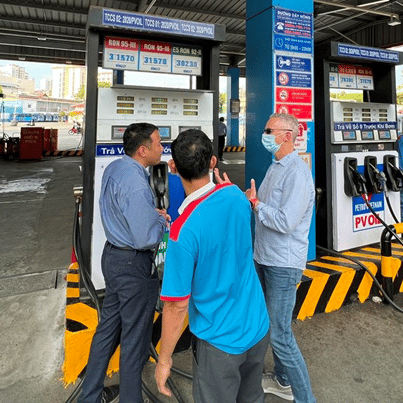The U.S. Grains Council’s (USGC) Southeast Asia and Oceania (SEA&O) office recently participated in the Clean EDGE Asia business mission, a clean and renewable energy-focused trade mission organized by the U.S. Department of Commerce. The mission aimed to increase U.S. exports of products and services to the Indo-Pacific region to strengthen energy security, enhance energy access, promote open and efficient energy markets and advance clean energy and climate goals in Southeast Asia.
The trade mission made stops in Indonesia, Vietnam and the Philippines – three key markets for USGC’s ethanol-focused programming – where delegates met with government and industry stakeholders in the clean and renewable energy sector. Council representatives were joined by ethanol industry partner Growth Energy for the duration of the trade mission.
“Clean EDGE was an opportune time to further convey to stakeholders around the region the environmental benefits of fuel ethanol and underscore its readiness as a tool to mitigate emissions from the transport sector immediately,” said Caleb Wurth, USGC SEA&O regional director.
“The mission also provided us an opportunity to strengthen alignment with the U.S. Department of Commerce as the department and its sister agencies implement the clean energy pillars of the Indo-Pacific Economic Framework (IPEF). The Council sees IPEF as an additional strategic tool to promote ethanol use across Southeast Asia.”
The three countries visited are the highest priority markets for USGC ethanol programming in Southeast Asia given their consumption volumes and appetite to mitigate emissions from the transport sector.
The Philippines currently consumes more than 1.5 billion gallons of gasoline per year and is a regional leader in fuel ethanol use, having maintained an E10 mandate since 2011. U.S. ethanol currently supplies roughly 40 percent of the country’s annual ethanol demand of about 170 million gallons per year. Regulators are now evaluating an expansion of the E10 mandate to an E15 or E20 discretionary ceiling in a bid to further mitigate transport emissions and create more space for retailers to generate savings for consumers.
Indonesia, the fourth most populous country in the world, consumes around 10 billion gallons of gasoline per year and is primed to become one of the largest gasoline markets in the world based on its current growth rate. The Council is working with stakeholders to implement a new E5 pilot project in major metropolitan areas that requires some 6.6 million gallons of ethanol. This is in addition to the three percent ethanol allowance in imported gasoline being maximized due to the Council’s work to remove a ban on ethanol in Indonesia’s fuel specification.
Vietnam consumes close to three billion gallons of gasoline each year, with demand forecasted to grow at a double-digit rate over the next five years. U.S. fuel ethanol, which supplies a significant portion of existing demand in Vietnam, can further support this growth by helping the country meet commitments to emissions reduction and reduce fuel costs for its growing middle class. Presently, regulators are evaluating the expansion of country’s E5 RON 92 mandate.
About The U.S. Grains Council
The U.S. Grains Council develops export markets for U.S. barley, corn, sorghum and related products including distiller’s dried grains with solubles (DDGS) and ethanol. With full-time presence in 28 locations, the Council operates programs in more than 50 countries and the European Union. The Council believes exports are vital to global economic development and to U.S. agriculture’s profitability. Detailed information about the Council and its programs is online at www.grains.org.

